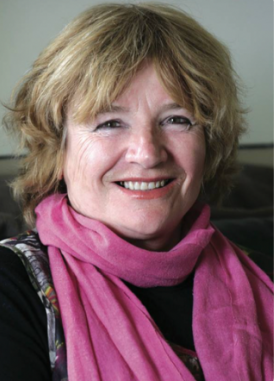 The Australian Forum for Acoustic Ecology is saddened at the loss of Susan Frykberg, who passed away in Whanganui, New Zealand on Friday, April 7, 2023. She was 68 years old. Susan was a much loved and active member of the AFAE for many years, and was instrumental in the founding of the World Forum for Acoustic Ecology and delivery of acoustic ecology courses at Simon Fraser University. The World Forum for Acoustic Ecology has prepared an In Memoriam page with commemorations of Susan. Cat Hope, Susan's PhD supervisor, wrote an obituary for Susan in Australia's CutCommon Magazine, reproduced here with permission: "Susan Frykberg was an electronic music composer and sound artist whose music practice became an increasingly spiritual one. A citizen of both New Zealand and Canada, she lived most recently in Melbourne where she was a key part of the music scene over the last 10 years. Frykberg composed more than 80 musical works during her life, including music for acoustic, theatre, and religious settings in addition to many electroacoustic works. For her, music was an expression of her creative, intellectual, and spiritual life, and she was involved in key electroacoustic music scenes wherever she lived. She passed away in Whanganui, New Zealand from a terminal illness, amongst her family. Born in Hastings, New Zealand, Frykberg undertook her undergraduate music studies with a minor in Theatre at the University of Canterbury, where she focused on computer music. Over time, she studied with composers such as John Rimmer, Barry Vercoe, Barry Conyngham, Barry Truax, and took classes with Iannis Xenakis and John Cage. She moved to Toronto, Canada in 1979 where she worked as a freelance composer, collaborating on the Structured Sound Synthesis Project with Bill Buxton at the University of Toronto, with the Canadian Electronic Ensemble and the composing collective Gang of Three. A key work from this period is Transonances (1984), a 50-minute piece characterised by voices subjected to and augmented by a range of treated and synthesised sounds. These were soundworlds she would return to throughout her life, as she sought a way to address what it meant to be a human continually augmented by technology. In 1986, she moved to Vancouver where she completed a Masters Degree in Electroacoustic Composition at Simon Fraser University. She taught Acoustic Ecology there for several years, immersing herself in what was the centre of soundscape studies at that time, working alongside Hildegard Westerkamp and others. This period would profoundly influence her approach to composition and life thereafter, and she remained in close contact with her colleagues after she moved back to New Zealand in 1998. There she undertook studies in Classics and Theology at the University of Otago, and a five-year hiatus from composing ended in 2002 with the notated a cappella vocal work Virgin Mother, performed by Baroque Voices for RNZ Concert. She moved to Melbourne around 2014. Frykberg’s music has been performed around the world in radio, concert and academic settings. Key works include Astonishing Sense of Being Taken Over by Something Far Greater Than Me, (1998) from the Astonishing Sense album released on Canadian label Earsay. Featuring violinist Nancy DiNovo, it is a beautiful, deep, and haunting piece that makes part of her extraordinary Audio Birth Project, a collection of works based on interviews with women about giving birth, including her sisters and mother, whose voices feature alongside cello, violin, piano, and soundscapes processed via a wide range of electroacoustic techniques. Women were often at the centre of her works – both conceptually and practically. The project was widely acclaimed, with articles in international publications such as Computer Music Journal, eContact and SplendidZine, and went on to be programmed as part of the 2008 Congress for the International Alliance of Women Musicians in Beijing, China. More recently Frykberg was the lead composer and librettist for the multiplatform opera by Matthew Sleeth, A Drone Opera (2015-2020), commissioned by Experimenta, Melbourne and premiered at Arts House. The opera developed into a film that was shown at the Sydney International Film Festival (2019), an installation at Carriageworks (2019), Sydney and went on to be shown at Ars Electronica, Austria in 2020. In the words of her close collaborator and vocalist in the opera, soprano Judith Dodsworth, the work was a commentary on our tenuous and complex relationship with technology and its ability to simultaneously seduce and menace us, where the main dramatic thrust focused on the increasing distancing and ‘outsourcing’ of modern warfare as drones are employed to carry out the butchery1. Into what could have become a very stark landscape Frykberg brought reverence, wonder, compassion, and humanity2. Dodsworth remembers Frykberg as constantly curious, searching for connection and meaning, always reaching out to share ideas and collaborate with extraordinary warmth, humour and generosity of spirit3. Theatre was often a feature in her work. Machinewoman (1985) uses dance, movement and live saxophone, with pre-recorded sound emanating from a portable sound-system as part of the performers costume. Her improvisational group Let The Art Sing (2010-2012) combined instruments from different cultures with electronics that interacted with works of art in various regional galleries across New Zealand. She saw music and theatre as one entity functioning to transform the people within the society. Frykberg’s other contributions to music are notable. She was a founding member of two core international organisations: the Canadian Electroacoustic Community and the World Forum of Acoustic Ecology, and and received an Honourable Mention in the International Alliance of Women Musicians New Music Competition in 2014. She produced programs about electroacoustic music for Radio New Zealand, and documentaries about Canadian composers for the Canadian Broadcasting Commission program Two New Hours. Her written publications include MusicWorks, Organised Sound, the International Journal of Man-Machine Studies, a range of conference proceedings and a forthcoming co-authored chapter with Dodsworth in the upcoming volume The Composer, Herself: Contemporary Snapshots of the Creative Process edited by Linda Kouvaras, Natalie Williams, and Maria Grenfell. She wrote an academic teaching text entitled Dimensions of Acoustic Communication, on which she based a series of workshops held for the public in Melbourne in 2019. In addition to her teaching in Canada, she also taught in Melbourne at RMIT and Box Hill TAFE. Susan commenced her PhD in Music Composition at Monash University in 2018, completed shortly before her passing. I had the pleasure to be the supervisor of her project on spirituality and electronic music, alongside Professor Constant Mews. She was working on a range of new compositions exploring the nexus of spirituality and electronic sound, including chants with electronics she had devised together with A Drone Opera collaborators Dodsworth and Hamish Gould. She was also developing larger scale electronic works that examine her own life through time, sounds created in space and the theories of the sixth-century music theorist, philosopher, and theologian Boethius, exploring a wide range of iPad applications for sound synthesis and editing. Other university graduate students note Frykberg’s enthusiasm to collaborate and support others, as someone with a genuine interest in others4, passionate and generous5, kind and caring6. It is important to acknowledge these wonderful contributions Susan Frykberg made to music worldwide, and their impact closer to home. Whilst this summary by no means considers all her achievements, as I met Susan later in her life, I hope this provides some insights to the importance of her work. The staff and students at Monash University will miss her joyous contributions. We are lucky to her wonderful, adventurous music to remember her by."
0 Comments
WFAE 2023 International ConferenceThe World Forum for Acoustic Ecology is excited to announce Listening Pasts - Listening Futures, its first hybrid virtual and in-person international conference since 2011, to be held in March 23-26 2023 both at the Atlantic Center for the Arts and online. The 2023 conference coincides with the 30th anniversary of the WFAE, founded in 1993, during 'Tuning of the World: The First International Conference on Acoustic Ecology' at the Banff Centre for the Arts. Featured guest speakers include Amanda Gutiérrez (Mexico/Canada), Claude Schryer (Canada) and David George Haskell (UK/USA). Three-day virtual tickets are available for $50 USD regular rate or $15 USD student rate. For more information, please visit the links below: Join the AFAE Discord ServerThe AFAE has just launched a new Discord server, where members around the continent can discuss all things acoustic ecology, including field recording, soundwalking, research and creative practice. To join the AFAE Discord server, join the AFAE as a member, with further instructions provided upon signing up. Left: Ebb and Flow by Vicki Hallett; Right: Image by Tristan Louth Robins AFAE 2022 ActivitiesAFAE Members have been involved in a variety of creative and research across 2022:
WFAE 2022 UpdatesOver the past year, the WFAE has seen a number of exciting developments:
For more information, visit wfae.net. The World Forum for Acoustic Ecology is excited to announce Listening Pasts - Listening Futures, its first hybrid virtual and in-person international conference since 2011, to be held in March 2023.
The 2023 conference coincides with the 30th anniversary of the WFAE, founded in 1993, during 'Tuning of the World: The First International Conference on Acoustic Ecology' at the Banff Centre for the Arts. Call for proposals: https://www.wfae.net/conference2023-cfp.html LOCATIONS Conference Hub and Co-Presenter: Atlantic Center for the Arts, New Smyrna Beach, Florida USA
DATES
REGISTRATION FEES Registration, with lodging at the Atlantic Centre for the Arts
Registration, with no lodging at ACA (accomodation to be sought be delegate)
Registration, virtual conference
Please note that recommendations for accomodation close to the conference site will be provided upon registrations opening in January 2023. DESCRIPTION Listening Pasts - Listening Futures convenes a global cohort as we mark the 30th anniversary of the founding of the World Forum for Acoustic Ecology (WFAE), and the first international conference on acoustic ecology in the United States of America. Now, as we mark this moment, we gather to consider how we can collectively and differently learn from the past, to imagine new futures based on a diversity of listening practices and acoustic relationships in our worlds. As the wider field of sound studies has matured, so have the contributions made by acoustic ecology to much current sonic scholarship and practice. At the same time, critical directions in sound studies have addressed the legacies of the World Soundscape Project and acoustic ecology directly: this is our chance, as a community, to reflect, look back, and re-imagine the core values of our field, its central approaches, methods, and key theorists of past, present, and future. We know acoustic ecology and soundscape studies have much still to give to the world at a pivotal environmental awakening. Among the appeals of ACA are its support of soundscape studies with the Soundscape Field Station artist residency and related programming, especially our shared mission and values of community engagement. These values reflect the topics in which we invite proposals including paper presentations, workshops, performances, and installations. Located near the Canaveral National Seashore, in the unceded lands of the Seminole people, Atlantic Center for the Arts offers access to the beauty of this wild coastal habitat. Mangroves, manatees, and Spanish moss are here in one of the region’s last remaining areas protected from development. 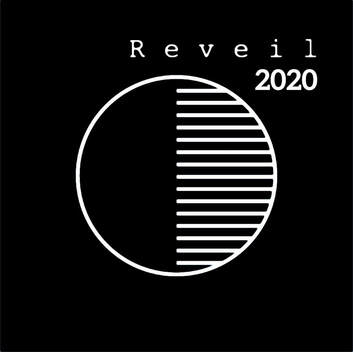 Reveil 2020 (International Dawn Chorus Day) Reveil is a collective production by streamers at listening points around the planet. Starting on the morning of Saturday 2 May in South London near the Greenwich Meridian, the broadcast picked up feeds one by one, tracking the sunrise west from microphone to microphone, following the wave of intensified sound that loops the earth every 24 hours at first light. In 2020 Reveil featured new streams from places where humans and non-humans meet, in soundscapes often radically altered by the Covid-19 pandemic. Many of these streams come from homes and gardens as people make connections between the domestic spaces where they find themselves. Themes of connection and collective practices addressing changes in public space inform the program of extended radio projects that accompanies the Reveil broadcast. Supported by Arts Council England originally as a series of site-specific commissions, these have become virtual projects that respond directly or obliquely to the current situation. They help to recollect kinds of sociability that have been lost and point to others on the way. This is imagined sonically as an acoustic commons in the making. On the Thursday prior to Reveil 2020, the AFAE was involved in one of Arts Front's Little Lunches, with AFAE president Leah Barclay talking with Tristan Louth Robins, Nicole Caroll and Jesse Budel about their featured streams in the event. The live stream recording of this discussion can be viewed below. Reveil 2020 was mixed live by Soundcamp in London UK (Grant Smith, Hannah Kemp-Welch) and Crete GR (Maria Papadomanolaki) with guest mixers in South River Ontario CA (Darren Copeland, NAISA) and Sunshine Coast, Queensland AUS (Leah Barclay, AFAE and Biosphere Soundscapes). For more information on Reveil, visit https://soundtent.org/soundcamp_reveil.html Art Front's Little Lunch #25, featuring AFAE members talking about Reveil 2020 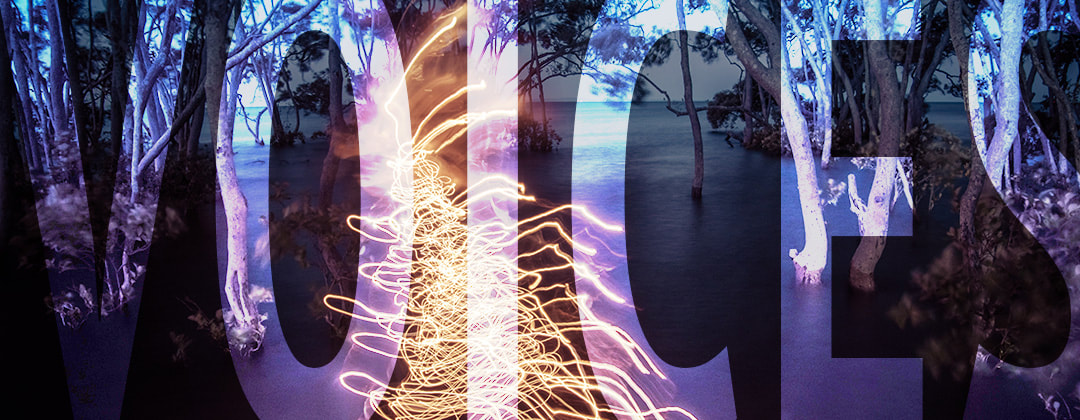 Voices of Nature 2020 (AFAE-AELA Partnership) "Voices of Nature 2020" was a national arts celebration presented by the Australian Earth Laws Alliance (AELA), AFAE and Arts Front to generate dynamic, cross-disciplinary interactions and projects for “Voices of Nature 2020”, and look forward to engaging with the science, technology, art, wonder and acoustic expertise of AFAE members. “Voices of Nature 2020” explored of the concepts of ‘voice’, ‘standing’, ‘representation’ and ‘agency’ of the natural world within human governance systems. The theme also promoted AELA’s desire to focus on sound art and acoustic ecology as key mediums for communicating and exploring nature’s voice/s. The program featured a variety of different platforms, including:
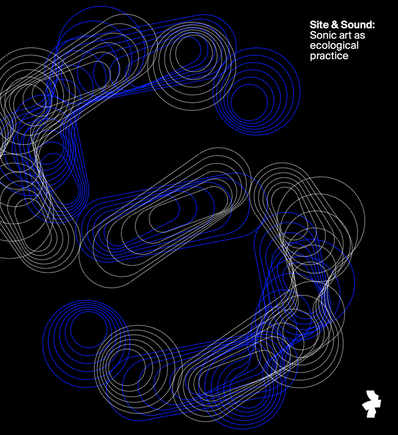 Site and Sound: Sonic Art As Ecological Practice Exhibition Site and Sound: Sonic Art As Ecological Practice is a new art exhibition offering immersive sound environments and listening events in a bid to help us come to grips with urgent and complex environmental issues. Exhibiting at the McClelland Sculpture Park + Gallery in Langwarrin, Victoria until April 11 2021, the show features works by 27 sounds artists, including AFAE members Leah Barclay, Ros Bandt and Nigel Frayne, and acoustic ecology pioneer Barry Truax. More information can be found in articles by The Age and Australian Financial Review, or on the gallery website. Other NewsSoundscapes in the time of COVID-19: Observations around the globe
Following COVID-19 lockdowns around the globe, there have been numerous observations made on the impact of reduced human activity in acoustic environments:
Here, we look at a number of updates from AFAE members, focussed on activities occurring across 2020 and into 2021. Read on for updates from Ros Bandt, Vicki Hallett, Tristan Louth Robins, Jesse Budel, Clare Hall and Anthony Magen:
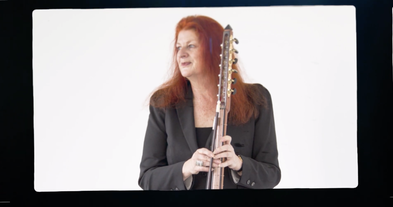
Australian Art Music Awards:
Ros Bandt receives Distinguished Services to Australian Music Award As part of the 2020 Australian Art Music Awards, AFAE member Dr Ros Bandt has received an award for Distinguished Services to Australian Music. The oration for her award outlines her "compelling contribution to Australian music": "If it is the task of an artist to transcend her medium, then Dr Ros Bandt is an exemplar in her field. As composer and sound artist dedicated to intercultural acoustic improvisation, she has created a globally-recognised body of work over four decades. Whether working in the ancient cities of Crete or in the Australian bush, working with First Nations peoples or in other cross-cultural collaborations, she has made a unique career showcasing her liminal sonic compositions. Dr Bandt's first environmental recording was made in a water tank in 1979, using a reel-to-reel tape recorder, a length of sewer pipe, a gong and a Renaissance recorder. As her oeuvre developed, she implemented electroacoustic sound fields, electronic instrumentation and acoustic sculptures. A superb instrumentalist, she adopted the tarhu, a hybrid-string instrument developed in Australia, to further augment her compositions. Dr Bandt's academic career is significant, and the book, 'Sound Sculpture', is a seminal book in her field. She directs the Australian Sound Design Project at Melbourne University, has taught sound art at the VCA and RMIT and advanced improvisation at the Box Hill Institute, and is in demand as a keynote speaker. The first woman to be awarded the Don Banks Music Award in 1991, she has also won the inaugural Benjamin Cohen Peace Prize and the Sound Art Australia Prize, funded by the ABC and Goethe-Institut. Dr Bandt is an inspiration to those who pursue art as a measure of worlds that would not reveal themselves to us unless someone first opened them up for inspection." A comprehensive overview of Bandt's work can be read in Linda Kouvaras' AMC article, 'Ros Bandt: Sound-Sculptor/ Poet-Protector/ Crusader of the Land'.
Vicki Hallett: Habitat and Barwon Listening (with Ros Bandt)
Habitat is a creative project by three Australian musicians - AFAE Member Vicki Hallett on woodwinds and loops, Jeremy Alsop on bass, strings and laptop and Steve Falk on marimba and percussions - with Jem Savage as sound engineer and video by Marie Pangaud. The project uses recordings of elephant vocalisations from Cornell Lab's Elephant Listening Project as its main source material.
This concert recording captures one of the last live Australian music performances before COVID-19 caused the industry to shut down. It is the culmination of a creative project between three musicians who share a passion for using the sounds of the environments of endangered species to highlight their plights through innovative performances employing the universal language of music. A Facebook Live stream of the performance on World Elephant Day, August 12, featured an introduction by Vicki Hallett, Jeremy Alsop, Leah Barclay and Rachel Morley. The Habitat project shares a listening experience which invites you to immerse within the environment of the Forest elephant in Africa. The listener is invited by the Call of the Forest to enter the Central African forest, gather some leaves and collect honey. Further down the trail, and if all goes well, you just may encounter the endangered African forest elephants. The Habitat EP, released on World Elephant Day, is available for purchase at https://habitat3.bandcamp.com/album/habitat. 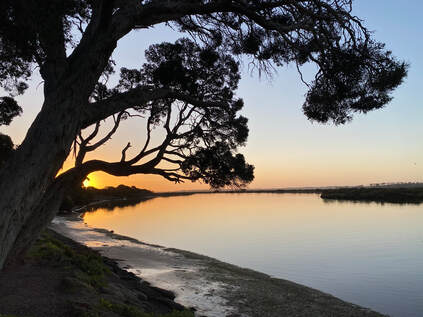 Barwon River at Sunset. Photo by Ros Bandt. Barwon River at Sunset. Photo by Ros Bandt.
Barwon Listening: seawater/freshwater - What do we hear? Ros Bandt and Vicki Hallett are two sound artists and musicians passionate in their interpretation of the environment through sound. Their creative works are derived from original recordings and research of habitat. Barwon Listening focuses on sensing the Barwon River in Victoria, Australia. Exploring the river from their kayaks, using hydrophones and other recording devices, Bandt and Hallett will track the River from the Otways to the estuary where freshwater meets saltwater. How many species of fish, eels, underwater insects, seagrasses, crustaceans and birds are having dialogues we can’t usually share? Many little-heard sounds will be uncovered and woven into new sonic creations: what does it feel like to be in the sound world of a mangrove, a seal, a pelican? These river experiences will become exploratory artworks attuned to the river itself. Works will be shared through live performances, installations and online through the Hearing Places website: www.hearingplaces.com 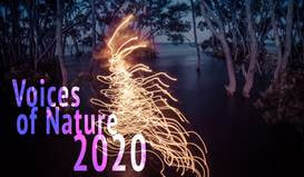 Kayak exploration. Photo by Ros Bandt. Kayak exploration. Photo by Ros Bandt.
WHY SOUND? WHY LISTENING?
Sound is a powerful indicator of what is happening in a given space, its life and health. Listening, tuning in to what is around us, informs us of presence & absence, the behaviour and interrelationships of living things. Being together, reflecting and creating, Sensing Sound duo gives value and respect to the habitat, what has gone before, what we hear now and how it inspires musical creativity. This project uncovers and celebrates many little-heard sounds in unique ways for all to share. Listening is immersive, requiring attentiveness. Sound-sensing eclipses science and art in different ways every second. Did you hear it? 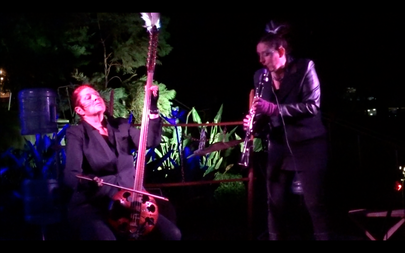 Sensing Sound, Ros Bandt (left), Vicki Hallett (right). Photo by Arthur McDevitt. Sensing Sound, Ros Bandt (left), Vicki Hallett (right). Photo by Arthur McDevitt.
“Sensing Sound” duo, Ros Bandt and Vicki Hallett, brings together two creative environmental sound artists and performers who probe nature-human relationships in outdoor and indoor contexts. Each installation and performance is an organic osmosis of audible, visual, sculptural and performative elements rendered from the site itself. They have collaborated for the last four years, creating original environmental site-specific spatial sound works, commissioned twice by the City of Greater Geelong for Geelong After Dark (GAD) creating the night works Earthscape 2018 and Human Aquarium public installation (2019) joined by collaborator Jem Savage, creative sound designer.
Bandt and Hallett have performed at SeenSound, the Loop Bar, New and Experimental Arts Laboratory (NEAL), the Tate Gallery, Fryerstown and devised interactive multichannel audience participatory concerts and exhibitions such as Freshwater Listening to celebrate 10 years of acoustic ecology in Australia. Both artists, individually and together are key players in acoustic ecology, biodiversity, and underwater and wildlife recordings, continually sensing the environment through sound in unique spaces, from Africa (Hallett), to Greece (Bandt) and beyond. The Barwon River is their common home ground where they share a special attachment, individually and together. 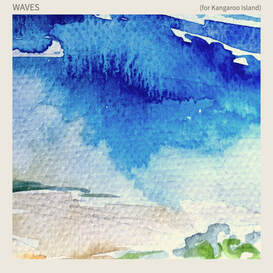
Member Update: Tristan Louth Robins
Following the devastating impact of bushfires around Australia in early 2020, a number of AFAE members have responded in the aftermath with soundscape works. AFAE Member Tristan Louth Robins curated a charity album, Waves (for Kangaroo Island), to raise funds for the recovery of the Kangaroo Island community in South Australia. Alongside this, Tristan has also included recordings made on the island in October 2019 on his Fleurieu and Kangaroo Island Sound Map, documenting soundscapes at Flinders Chase National Park and Hanson Bay prior to the fires.
Tristan explains more recent activities in his own words:
"Following the devastating bushfires of 2020, I returned to Kangaroo Island for a few days in September 2020 and documented soundscapes of Flinders Chase National Park and Hanson Bay, as well as other regions of the island for the Fleurieu & Kangaroo Island Sound Map. With a fairly open schedule for 2021, I’m keen to concentrate my research activities around the Fleurieu Peninsula. Over the 2020-21 summer I’ve been documenting the soundscapes of Lady Bay. With its intricate networks of reefs, sea grasses, fish and crustacean species, it’s a pristine coastal environment that I’m looking forward to investigating further, with recordings to be shared on the sound map in the near future. In terms of local engagement, I’m progressing plans to invite Fleurieu communities to a series of sound walks and recording workshops in and around the township of Normanville and Myponga Reservoir. These should hopefully eventuate by mid-2021. Away from the Fleurieu, my new permanent installation, Sternere is open to the public at the Barossa Adventure Station in Angaston, South Australia. Lastly, in recent months I’ve been doubling down on learning data science and I’ve just launched a blog, Wrangling In The Antipodes, which will examine environmental and acoustic ecology datasets through exploratory data analysis (i.e. lots of visualisations.)"
Jesse Budel
In mid-2020, Jesse joined the WFAE Executive as the new WFAE Secretary. Over the past half-year, various tasks have included included engagement with new affiliates in the US Midwest and Mexico, reconnecting with existing regional affiliates, holding the WFAE’s first-ever online board meeting, reviewing and updating WFAE bylaws first written in 1998, preparation of the WFAE’s Library and ongoing archival activities. More recently, Jesse released a new album entitled Cathedrals, featuring recordings from three Australian sites in or near UNESCO Biosphere Reserves. In part inspired and in part assisted by Leah Barclay’s ‘Biosphere Soundscapes’ project, the recordings document three locations: - Mary Cairncross Scenic Reserve on Jinibara Country (QLD), in the region of Noosa Biosphere Reserve - Wamoon/Wilson’s Promontory on Koori Country (VIC), site of Wilson’s Promontory Biosphere Reserve - Pukumako/Calperum Station on Meru Country (SA), site of Riverland Biosphere Reserve Click the Bandcamp link below to access the full album and find out more: 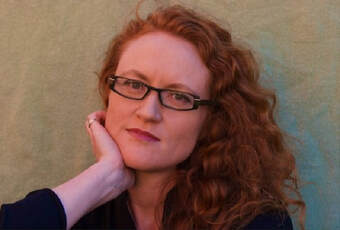
Member Profile: Clare Hall
Clare Hall (PhD) is Lecturer in Performing Arts, Monash University, Australia. Her research, educational and artistic practice coalesces around music, sound and performance to promote social justice through creative arts engagements. Her interdisciplinary scholarship bridges boundaries between the arts, education, and cultural sociology, with her key contribution to date in music and gender. This is the subject of her book Masculinity, Class and Music Education (2018), which aims to understand the social factors that affect young children’s musical identities. Clare’s scholarship draws on her background as a musician, dancer, performer, school-based and community-based teacher. This drives her work with pre-service and in-service teachers, school students and the wider community that aims to orchestrate democratic social spaces for creativity and community strengthening across the lifespan. Her critical pedagogies incorporate acoustic ecology to facilitate more meaningful listening and embodied engagements with the performing arts, the environment and each other. She experiments with sound walking, scaping, foraging, sound and movement improvisation and storying, which intersects with her research expertise in narrative, ethnographic and digital methods. She is currently working with colleagues on Greek music educators’ experiences of urban soundscapes in Corfu as part of the European project the Soundscape We Live In 2019. She is also working on troubling audism and ableism through deaf music-making in pandemic times. Clare is passionate about the part listening, sonic arts, and music making can play in decolonising music education, which she brings to her role as Co-founder/Leader of the Decolonising and Indigenising Music Education special interest group of the International Society for Music Education. For info go to: https://www.facebook.com/groups/ISMEDIME/ 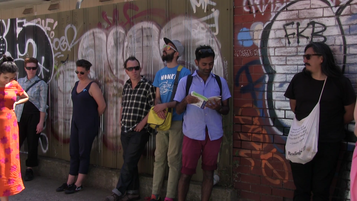 Image by Denby Smith Image by Denby Smith
In Situ Poetics: An Essay on Soundwalking in Melbourne
Poet, audio producer and literary/media scholar Prithvi Varatharajan recently published an essay, In Situ Poetics, in the Sydney Review of Books, recounting the experience of leading several soundwalks in Melbourne with AFAE member Anthony Magen, exploring the evolution in the city's soundscape from indigenous perspectives and early colonial era diaries through to the present day. You can read the full essay on the Sydney Review of Books website. Guest Post by USC Sound LabThe Australian Forum for Acoustic Ecology is taking part in #Reveil2020 on International Dawn Chorus Day this year. Reveil is a global arts project and international web broadcast that relays the sounds of live microphones tracking sunrise in multiple locations across the planet.
Starting just before daybreak in Rotherhithe near the Greenwich Meridian in the UK, the Reveil broadcast will pick up these feeds one by one, tracking the sunrise west from microphone to microphone, following the wave of intensified sound that loops the earth every 24 hours at first light. The stream will launch this weekend, starting on Saturday May 2nd at 2pm AEST as a radio broadcast hosted on the Reveil platform. Microphones have been rigged in a network of points across the world to reveal their acoustic ecologies. This year's event is set to reveal information about the state of the planet as a result of global lockdowns that are changing our sonic environments. People from across the planet, including London, Chicago, Montreal and our very own University of the Sunshine Coast (USC) team, will stream the broadcast live to radio stations for online listeners, providing a way to connect with nature and reveal these planetary changes during a time of disconnection. Working alongside the Reveil team in London, the USC team will be documenting the step by step process across social media platforms, such as Instagram and Twitter, as a global hub of information. Follow the event in real-time in Asia-Pacific timezones with the the USC SoundLab on twitter, instagram and facebook. Follow @SoundCamp for the global event and the #Reveil2020 for latest program information. Sunshine Coast soundstreams will be located in the rainforest canopy at Mary Cairncross, Maroochy River, Eudlo Creek and the Noosa Biosphere Reserve, tracking the chorus throughout the day. SoundCamp are an art collective based at Stave Hill Ecological Park in Rotherhithe coordinated by Maria Papadomanolaki, Dawn Scarfe and Grant Smith. Reveil 2020 will be mixed live from London, UK (Soundcamp, Grant Smith), South River, ON (NAISA, Darren Copeland), Sunshine Coast, Australia (Leah Barclay, Biosphere Soundscapes) and Crete, GR (Maria Papadomanolaki, Soundcamp). The Reveil schedule will bring together microphones from open windows, rooftops, gardens, forests, underwater and electromagnetic sites. The broadcast works with the Locus Sonus network to share sounds, ecologies and atmospheres as part of an emerging Acoustic Commons. Soundscape Volume 17, 2019 – Celebrating 20 Years of the Australian Forum for Acoustic Ecology12/12/2019 Soundscape - The Journal of Acoustic Ecology, Volume 17, 2019 |
Categories
All
Archives
April 2023
|





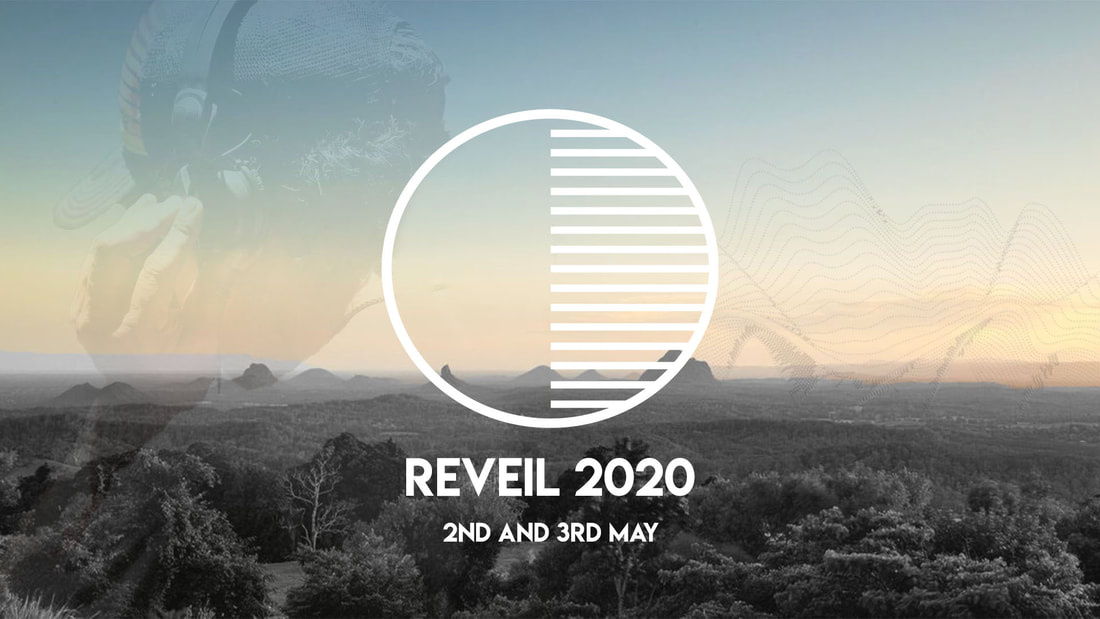
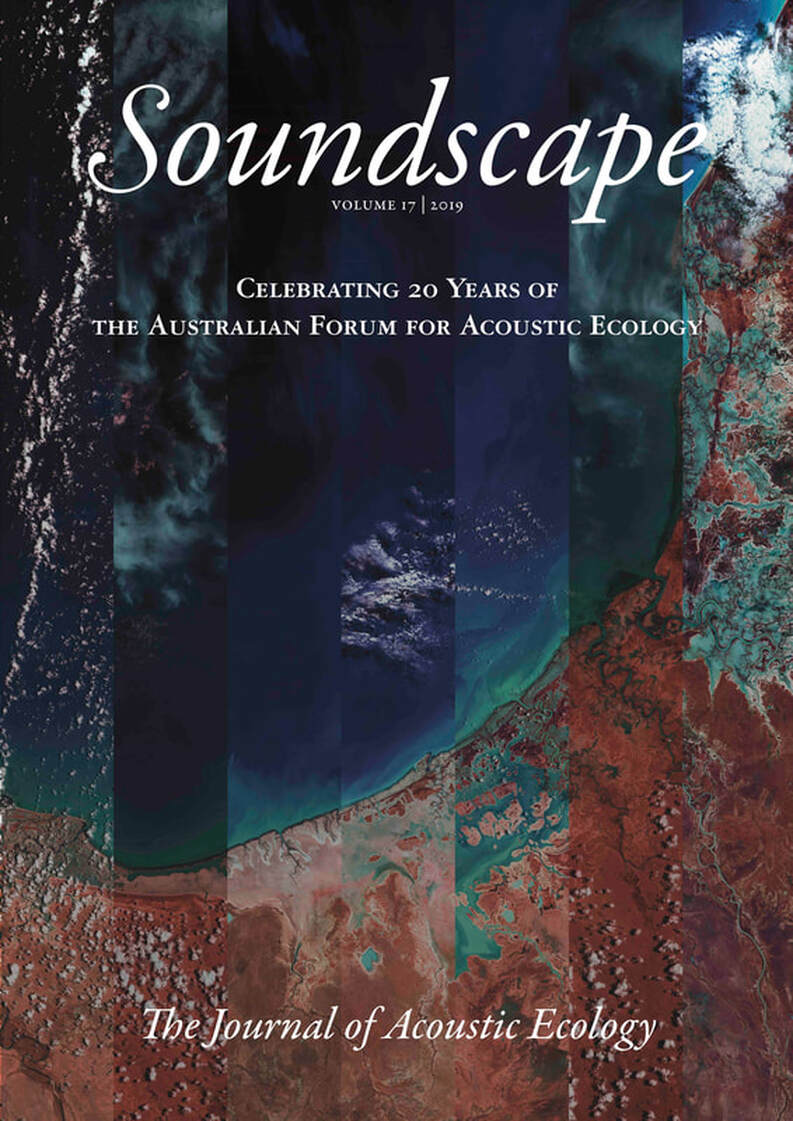
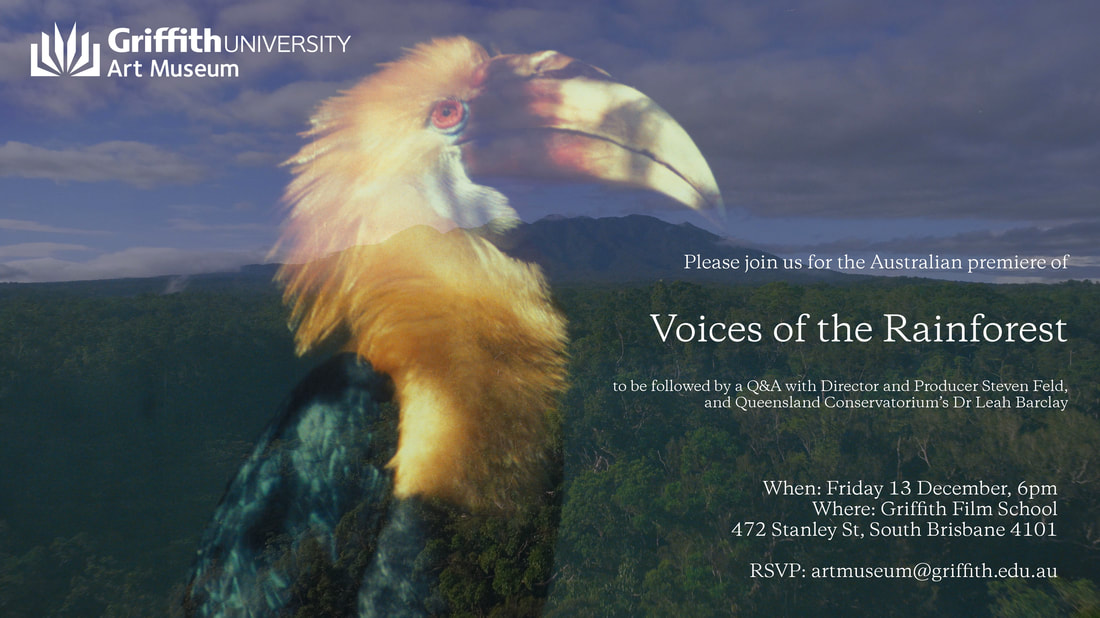
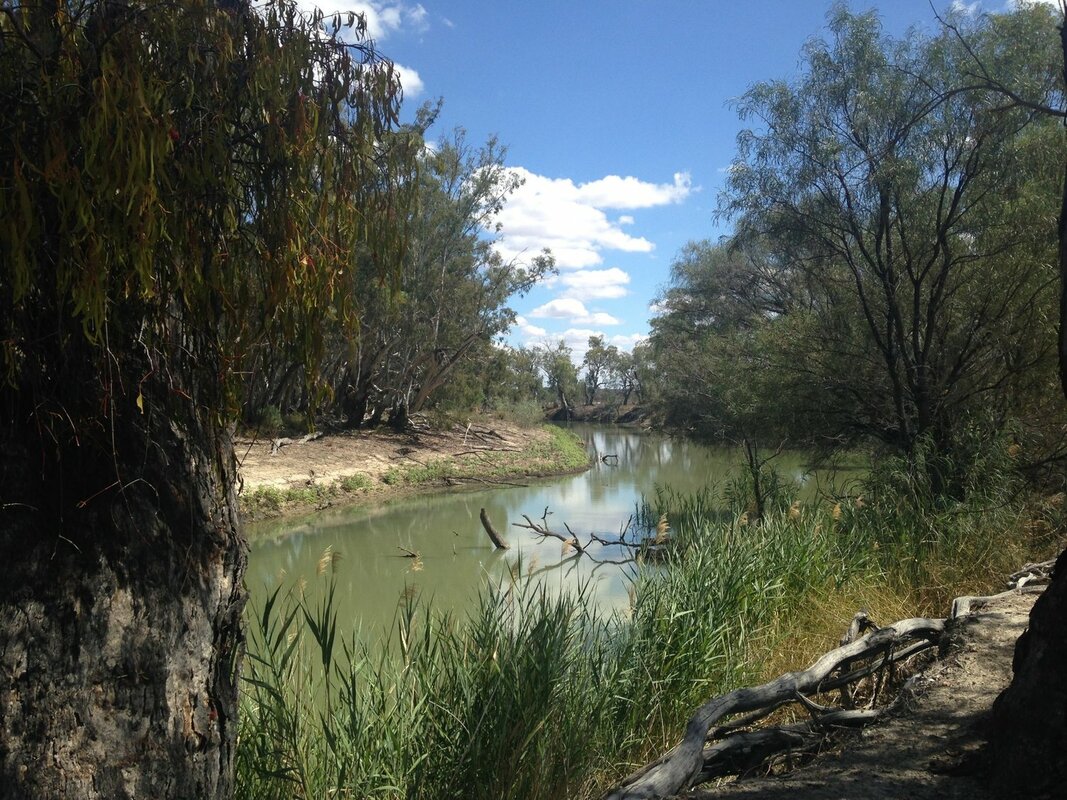
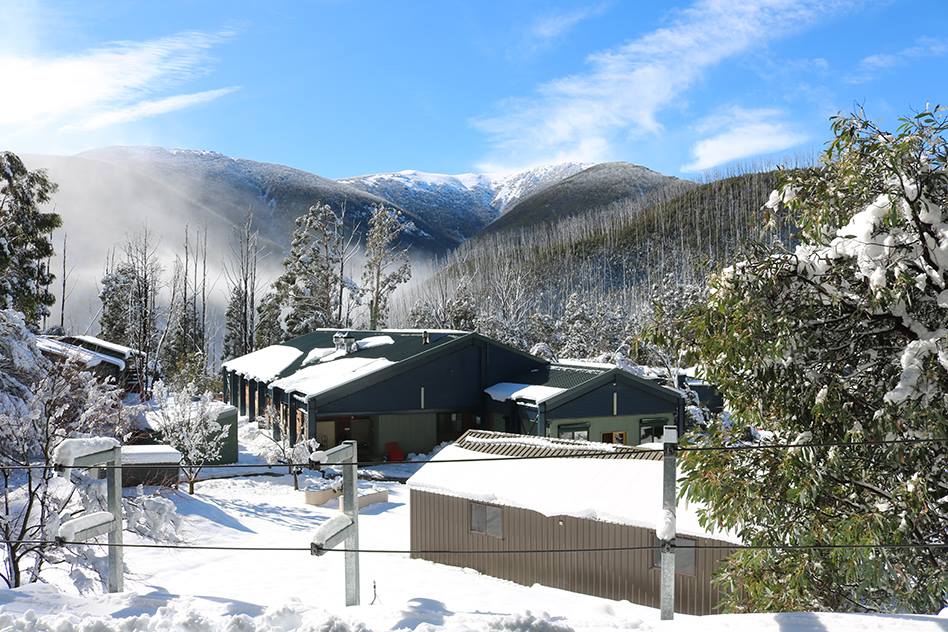
 RSS Feed
RSS Feed